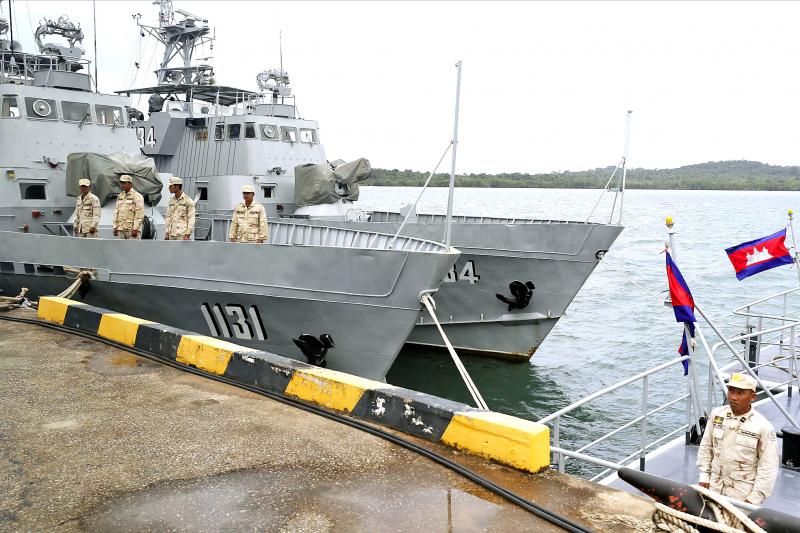A Cambodian naval base being constructed with the assistance of China is to include a portion for the exclusive use of the Chinese military, the Washington Post reported yesterday.
The Chinese and Cambodian governments have previously denied reports that Cambodia would allow a Chinese military presence at the Ream Naval Base on the Gulf of Thailand.
Such a presence would mark a significant expansion in China’s military access in the Indo-Pacific region, where it currently only has one naval base, in the east African nation of Djibouti.

Photo: AP
Citing unnamed Western and Chinese officials, the Post reported that the base would host the Chinese military in its northern section.
One Western official told the paper that expansion plans finalized in 2020 called for the Chinese military to have “exclusive use of the northern portion of the base, while their presence would remain concealed.”
A Beijing official confirmed the Chinese military would use a “portion” of the base, but denied it would have exclusive use.
Lowy Institute international security program director Sam Roggeveen said the new information, and particularly the apparent confirmation by a Beijing official, “strengthens the case that this is actually happening.”
“It’s fairly early days, so we don’t know what the capacity of the facility will be,” Roggeveen said. “Its practical value [to Beijing] is that it would allow China to deploy more readily its warships and coastguard vessels around the region, and to simply have a bit more presence, where once it would need to sail very long distances.”
Australian Prime Minister Anthony Albanese, who was visiting Indonesia yesterday, said he was concerned about the reports and called on the Chinese government to be open about its intentions.
“We are in regular contact with the Cambodian government and we have been consistently assured that no foreign military will be granted exclusive access at Ream,” Albanese told reporters in Makassar. “We’ve been aware of Beijing’s activity at Ream for some time. We encourage Beijing to be transparent about its intent, and to ensure that its activities support regional security and stability.”

MAKING WAVES: China’s maritime militia could become a nontraditional threat in war, clogging up shipping lanes to prevent US or Japanese intervention, a report said About 1,900 Chinese ships flying flags of convenience and fishing vessels that participated in China’s military exercises around Taiwan last month and in January last year have been listed for monitoring, Coast Guard Administration (CGA) Deputy Director-General Hsieh Ching-chin (謝慶欽) said yesterday. Following amendments to the Commercial Port Act (商港法) and the Law of Ships (船舶法) last month, the CGA can designate possible berthing areas or deny ports of call for vessels suspected of loitering around areas where undersea cables can be accessed, Oceans Affairs Council Minister Kuan Bi-ling (管碧玲) said. The list of suspected ships, originally 300, had risen to about

DAREDEVIL: Honnold said it had always been a dream of his to climb Taipei 101, while a Netflix producer said the skyscraper was ‘a real icon of this country’ US climber Alex Honnold yesterday took on Taiwan’s tallest building, becoming the first person to scale Taipei 101 without a rope, harness or safety net. Hundreds of spectators gathered at the base of the 101-story skyscraper to watch Honnold, 40, embark on his daredevil feat, which was also broadcast live on Netflix. Dressed in a red T-shirt and yellow custom-made climbing shoes, Honnold swiftly moved up the southeast face of the glass and steel building. At one point, he stepped onto a platform midway up to wave down at fans and onlookers who were taking photos. People watching from inside

Japan’s strategic alliance with the US would collapse if Tokyo were to turn away from a conflict in Taiwan, Japanese Prime Minister Sanae Takaichi said yesterday, but distanced herself from previous comments that suggested a possible military response in such an event. Takaichi expressed her latest views on a nationally broadcast TV program late on Monday, where an opposition party leader criticized her for igniting tensions with China with the earlier remarks. Ties between Japan and China have sunk to the worst level in years after Takaichi said in November that a hypothetical Chinese attack on Taiwan could bring about a Japanese

STREAMLINED: The dedicated funding would allow the US to transfer equipment to Taiwan when needed and order upgraded replacements for stockpiles, a source said The US House of Representatives on Thursday passed a defense appropriations bill totaling US$838.7 billion, of which US$1 billion is to be allocated to reinforcing security cooperation with Taiwan and US$150 million to replace defense articles provided to the nation. These are part of the Consolidated Appropriation Act, which the US House yesterday passed with 341 votes in favor and 88 against. The act must be passed by the US Senate before Friday next week to avoid another government shutdown. The US House Committee on Appropriations on Monday unveiled the act, saying that it allocates US$1 billion for the Taiwan Security Cooperation Initiative